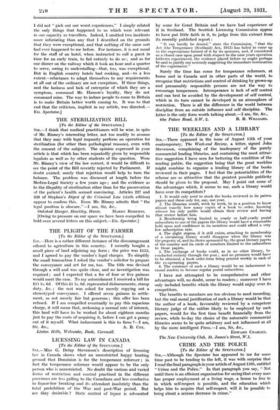THE WEEKLIES AND A LIBRARY
[To the Editor of the SPECTATOR.] 'Sin,—There appeared in the issue of August 15th of your contemporary, The Week-end Review, a letter, signed John Stevenson, complaining of the inadequacy of the purely commercial lending libraries, and containing the most attrac- tive suggestion I have seen for bettering the condition of the reading public, the suggestion being that the great weeklies might combine to organize a lending library of the books reviewed in their pages. I feel that the potentialities of the scheme are so attractive that the greatest possible publicity should be given to the proposal. May I point out some of the advantages which, it seems to me, such a library would
have over its competitors?
1. It would only need to stock the books reviewed in its patron papers and these only for say, one year. 2. The librarian would, week by week, be in a position to know almost exactly how many copies of a book to order, knowing whence his only public would obtain their review and having that review before him. 3. Membership being limited to yearly or half-yearly postal subscribers to one of the papers the library would have a reasonable hold upon and confidence in its members and could afford a very low subscription rate. 4. The slight stigma, if it still exists, attaching to membership of a circulating library would disappear when the library was the property of, and its choice sponsored by, the great literary papers of the country and its circle of members limited to the subscribers to those papers. 5. The exchange of books could, as in no other library, be conducted entirely through the post ; and no premises would have to be obtained, a book order-form being printed weekly in each of the co-operating papers. 6. The existence of such a library would be an inducement to casual readers to become regular postal subscribers.
I have not attempted to be comprehensive and other advantages will, no doubt, occur to readers ; moreover I have only included benefits which the library would enjoy over its competitors.
The benefits to members are too obvious to need recording, but the real moral justification of such a library would be that the author of a book, favourably reviewed by a competent literary judge of the calibre likely to be employed by such papers, would for the first time benefit financially from the review, while to-day the choice of the autocratic commercial libraries seems to be quite arbitrary and not influenced at all by the more intelligent Press.—I am, Sir, &c.,
EDWARD CHARLES.
The New University Club, St. James's Street, Wa.


























 Previous page
Previous page